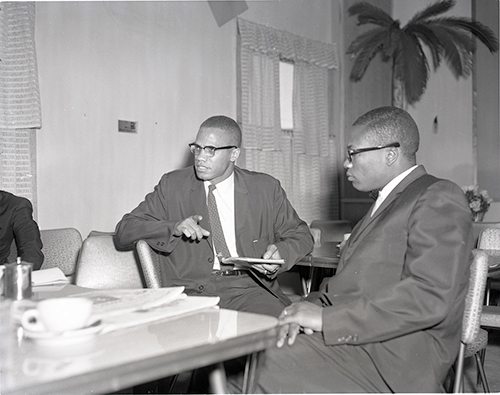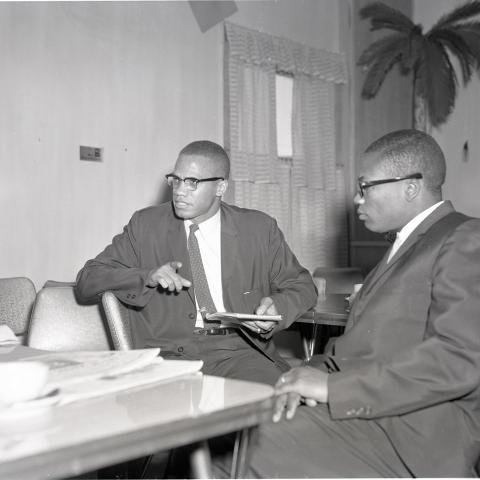The Malcolm X Interview
by Keith Rice, Ph.D., Historian/Archivist, Tom & Ethel Bradley Center - April 15, 2025
Malcolm X was born to Earl and Louise Little in Omaha, Nebraska on May 19, 1925. He spent his childhood and early teen years in Lansing, Michigan. Malcolm X was assassinated on February 21, 1965, while speaking at the Audubon Ballroom in New York City. The year 2025 marks the 100th anniversary of his birth and 60th of his tragic death. Malcolm X spent his brief time on earth in a constant state of evolution. Coming of age during Jim Crow could have limited Malcolm X to a life of servitude not that far removed from slavery. However, Malcolm X’s parents raised him and their six other children together with a sense of Black racial pride that Malcolm X maintained throughout his lifetime.
 In a life changing event Malcolm X was arrested in 1946, while retrieving a stolen watch he had left at a repair shop. He received a sentence of eight to ten years for breaking and entering. While imprisoned Malcolm X was introduced to the Nation of Islam, a black separatist religious organization. Upon his release from prison in 1952, Malcolm X rose quickly through the ranks of the Nation of Islam under the mentorship of its leader Elijah Muhammad. In 1954 he was selected to lead Temple # 7 in Harlem, New York. He also served as the national spokesman for the Nation of Islam.
In a life changing event Malcolm X was arrested in 1946, while retrieving a stolen watch he had left at a repair shop. He received a sentence of eight to ten years for breaking and entering. While imprisoned Malcolm X was introduced to the Nation of Islam, a black separatist religious organization. Upon his release from prison in 1952, Malcolm X rose quickly through the ranks of the Nation of Islam under the mentorship of its leader Elijah Muhammad. In 1954 he was selected to lead Temple # 7 in Harlem, New York. He also served as the national spokesman for the Nation of Islam.
Malcolm X also had a strong presence in California. He played a major role in the establishment of the Nation of Islam’s Temple #27 in Los Angeles. While building the membership of Temple #27 in 1957 and 1958, Malcolm X also wrote articles for the Los Angeles Herald Dispatch, a Black-owned weekly newspaper and Nation of Islam ally. He also gave lectures to members of the Black community on the inequalities and racism plaguing Black people in the United States.
In 2013, civil rights activist Gwen Green contacted the Tom & Ethel Bradley Center offering to help provide metadata for the Center’s African American photographic digitization grant. She eventually introduced the Bradley Center to her longtime friend Fred Hardon. In 1963, Fred Hardon had the opportunity to meet Malcolm X at an event hosted by his sister Nira Hardon and Gwen Green at his parents’ home. At the time Fred Hardon conducted/recorded interviews with members of the African American community. As a public service he would let a local radio station broadcast them. During the event at his family’s home Fred Hardon built up his nerve and approached Malcolm X and requested an interview.
Malcolm X agreed to meet with him the next day at the local Nation of Islam’s Temple #27 to discuss the matter. At the meeting Malcolm X agreed to come to the Hardon household at midnight for the interview. Unlike civil rights organizations Malcolm X and the Nation of Islam did not believe in turning the other cheek against anti-Black violence employed by white supremacists. In the interview Malcolm X and Mr. Hardon discuss subjects such as the idea of Black people having equal rights in a white-controlled society. Malcolm X argues that true equality is impossible in such a society. He advocates for either returning to Africa or establishing a separate territory within the U.S. for Black people to be independent.
Malcolm X criticizes Martin Luther King Jr.'s approach, arguing that it disarms Black people by teaching them to love their oppressors and seek integration without first securing economic stability. Malcolm X expresses the importance of human rights over civil rights. He also discusses the trial stemming from Los Angeles Police Department (LAPD) officers’ shooting of several members of the Nation of Islam and murder of Ronald Stokes on April 27, 1962. Malcolm X highlights the lack of media coverage and the trial’s significance as a case of police brutality and injustice against Black people. Mr. Hardon has graciously donated the recording of the interview with the approval of the Malcolm X estate to the Tom & Ethel Bradley Center. The interview and transcript are now available online.
Image Gallery
Post tagged as: bradley center, audiovisual materials, los angeles
Read more Peek in the Stacks blog entries